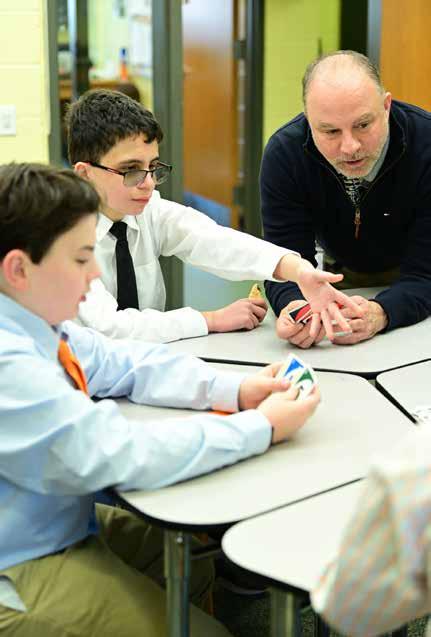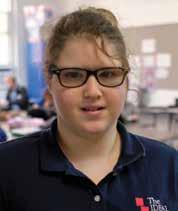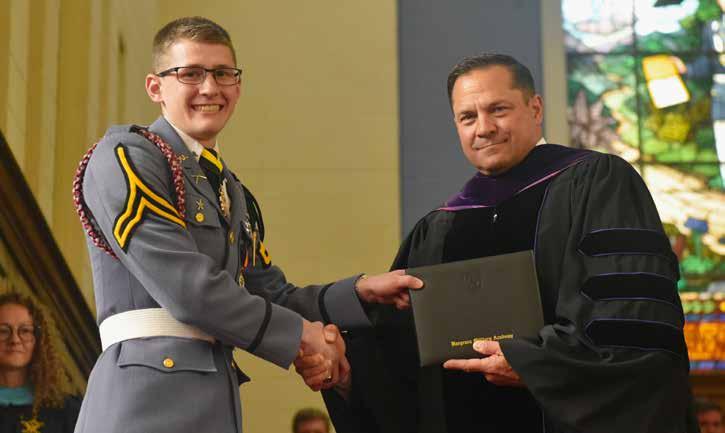INDEPENDENT SCHOOLS, COLLEGES, AND SUMMER PROGRAMS GUIDE

> ACADEMIC CONCERNS FOR YOUR CHILD
> THE KATONAH MUSEUM OF ART’S LEARNING CENTER
LANDMARK COLLEGE
If you have concerns about your child’s acquisition of the curriculum, or a specific academic struggle that impacts his/her ability to progress and learn in school, or concerns for social/emotional and behavioral issues, now is the time to start collecting your own data regarding your concerns. Teachers collect data through assignments and tests but it is important you collect your own data. The academic experience you have with your child at home can be very different than the experience the teacher has while your child is in school. All data points are needed to fully understand your child as a student and what his/her unique learning needs are.
Why start collecting your child’s work samples now?
Time is of the essence. When parents seek out support for their child or request evaluations from the school district the initial response predictably will be, “Let’s put a few interventions in place over the next few weeks and see how the student responds. We will meet again in 4-6 weeks to look at the data.” Having your own data, saved emails documenting your concerns, and dated summaries of conversations with teachers will prevent a delay in starting evaluations. Your data collection will be of paramount importance should you request a meeting with the Child Study Team or request the Committee of Special Education to evaluate your child.
Data You Need to Collect
Be sure to date, scan, or screenshot all materials & save in a designated folder.
STUDENT WORK SENT HOME FROM SCHOOL
These work samples from school tell us a lot about how a student learns and how quickly they become independent with the content that is taught. Make note of the teacher’s comments or corrections on the returned work. Identify a trend in your child’s errors if possible or a reoccurring comment from the teacher.
HOMEWORK
How your child completes homework (or doesn’t) provides multiple clues and important data. A child may grasp a new

ACADEMIC CONCERNS FOR YOUR CHILD
BY ANNE CUNNINGHAM, EDUCATIONAL ADVOCATE
concept when it was taught in class but hours later may not be able to recall how to proceed with the newly taught information. Your child may become task-avoidant, easily give up, plow through the assignment with many errors, or exhibit other behaviors that communicate frustration due to the level of difficulty he/she is experiencing.
TIME SPENT ON HOMEWORK
Students, especially younger students, should not be spending lengthy periods of time completing homework because it is a struggle for them. Ask your child’s teacher what’s the appropriate amount of time for your child to be spending on the different assignments sent home.
Once your child reaches the allotted time for an assignment have them stop where they are. Write a note at the top of the page that your child was only able to complete as much as he/ she did in the allotted time.
If the assignment is on the computer take a screenshot and move it to the designated folder on your desktop. Send your child’s teacher an email letting him/her know that your child got as far as he/she did in the time allotted. If possible, observe where your child struggled and make note of it.
ASSISTING YOUR CHILD WITH HOMEWORK
Before helping your child with their homework, ask your child to work through one problem or question on their own while you observe. Try to identify where your child gets stuck/ doesn’t know the next step/struggles reading specific words, etc. Then offer your child the support of reteaching the material or working through the concept they struggled with.
This data allows you and the teacher to identify where your child struggled and the level of support your child needed to complete the homework. Write a note on the homework to the teacher regarding the support your child needed, date the page, scan it, and put it in the appropriate file.
For older students, encourage your child to try each equation or question. When they get stuck or don’t know what to do next, they should write a quick note next to the equation or question such as:
“I don’t know what to do with the 8.”
“I don’t know the next step.”
“I can’t find the answer in paragraph 2.”
72 WESTONMAGAZINEGROUP.COM
This demonstrates to the teacher that the student did attempt to do the homework and should receive credit. It also allows the teacher to use the homework as a diagnostic tool to determine the appropriate support he/she will need to provide your child.
STUDYING
Many parents report they studied with their child, their child knew the material when they went to school, however, performed poorly on the test/quiz. Many times, older students study on their own and perform poorly on a test or quiz. The method a student used to study for a test or quiz is very important data.
You want to observe and note:
• Did you verbally ask your child questions and did he/she respond verbally?
• Did you present the study material to be studied in a visual manner, written form: flashcards, repeated writing of a word or definition?
• Did you use verbal responses and visual aids together?
Your child may be a verbal learner. If the test is a written test they may score poorly on the test. If your child has a reading issue, written tests will be more challenging for them. It is important to note how your child studied.
READ, READ, READ
If your very young child can’t read – read to her/him. Ask your child to point to specific pictures on a page. This builds vocabulary and a love of reading.
If your child is an emerging reader – listen to him/her read and continue to read aloud to him/her. This allows you to observe and note if your child struggles with letter/sound identification, has difficulty remembering sight words, as well answering comprehension questions you can ask. This is collectible data.
If your older child can read independently – read the same book as him/her and have a book discussion. This is an opportunity to informally assess your child’s reading skills such as comprehension, ability to infer, summarize, and retell. This is collectible data.
SOCIAL/EMOTIONAL CONCERNS
Data collection is essential when you seek out interventions or evaluations for your child’s social or emotional struggles. Data on social/emotional issues that prevent your child from attending school, remaining in school for the entire day, or spending more time in the Nurse’s Office than in class during instructional time needs to be collected.
• Parents should record the date/time and pressing issue their child struggled with leaving the house for school or if you were called to pick your child up early from school due to social/ emotional issues.
• Use this data to identify any trends that exist: time of day, class period, subject, peers in class, etc.
Parents want to be very proactive seeking out and working with their pediatrician, psychologist, or psychiatrist to offer their child the support he/she needs. Appointment dates should be noted to demonstrate you are taking proactive steps outside of school to address your child’s social/emotional issues.
• A letter from your pediatrician, psychologist or psychiatrist is most beneficial to support your child’s needs to be evaluated when you make that request of the school.
If your child is being bullied on social media and it is impacting your child’s emotional well-being to go into school, it is important you take screenshots of the content from the social media platform. This, too, is important data.
BEHAVORIAL CONCERNS
If a parent is (1) called to school to pick up their child early for behavioral issues, (2) if a parent is told their child spent time outside of the classroom due to behavioral issues or problems, or (3) if your child is suspended for behavioral outbursts or physical altercations, the following data is necessary to collect.
• Date/time of incident
• What action your child took
• What took place prior to your child acting out
• What subject was being taught?
• Level of adult supervision at the time of the behavior
• Length of time the student was out of the classroom
• Support/counseling given to the student after the behavior
It is imperative for parents to have this information. Schools cannot continually remove students from class without taking a form of action such as evaluating the student or creating an intervention to support the student. Should parents need to request an evaluation because the school has not, this data is of paramount importance.
Having work samples and data to support the academic, social/emotional concerns for your child is indisputable when seeking out interventions or evaluations for your child. Stay organized. Be patient with your child. Your hard work and diligence will benefit your child.
Anne Cunningham, Educational Advocate, holds her Masters Degree in Special Education, Birth through 12th Grade. She has been supporting students and families as an Educational Advocate for 10 years in New York State: Westchester County, Putnam County, Orange County, the Boroughs of New York City; Connecticut and New Jersey, and throughout the United States.
Email annec@advocate4students.com
Follow on IG @advocateannec
X: @annecedadvocate and on
FB: Anne Cunningham, Education Advocate. For a free 30-Minute Consultation: advocate4students.com/free-consultation-offer
@ WESTONMAGAZINES 73
KATONAH MUSEUM OF ART’S POLLACK FAMILY LEARNING CENTER
Connection, interaction, artistic exploration, and creativity. These are some of the core objectives of the Katonah Museum of Art’s Pollack Family Learning Center. For over 25 years, this unique interactive space has welcomed visitors of all ages to engage in collaborative experiences, enjoy picture books, and create their own works of art with intriguing art materials. With each new exhibition presented at the KMA, the Learning Center space is transformed to complement the artworks on view. Early in the exhibition planning process, education and curatorial staff meet to begin developing upcoming installations. Some of the questions asked of each other: What would we like our visitors to experience? What concepts, materials, or artistic techniques may visitors be most interested in exploring? How can the Learning Center enhance our family visitors’ Museum experience?
For many years, the Learning Center focused on children’s picture book illustrators whose work correlated with the main exhibitions. Some highlights include the work of Eric Carle, Grace Lin, Jerry Pinkney, Giselle Potter, Brian Selznick, Peter Sís, and Rosemary Wells. After 2015, the Learning Center objectives expanded to also produce conceptbased interactive exhibitions and artist installations. Some memorable examples include “Line Lab” (2016) which explored the use of line in the work of Henri Matisse and “Design Studio: Wear Your Art” (2018) which offered activities related to wearable art forms and outrageous jewelry. In addition, the Learning Center has presented site-specific, artistic installations such as the crocheted environment “Let’s Step Inside” (2022) by artist Jeila Gueramian.

On view in the Learning Center through October 1st are original illustrations from the picture book The Bluest of Blues: Anna Atkins and the First Book of Photography , written and illustrated by Fiona Robinson. This exhibition complements the cyano-collage works of artist Wu Chi-Tsung who is featured in the main galleries. Included in the Learning Center are illustrations, working drawings, and cyanotype prints. Blue-themed art activities are available to visitors such as cyanotypes, blue mixed-media collages, and blue and white drawing materials.
The Learning Center is just one of the many educational programs offered at the KMA. Throughout the year, families can attend Family Day events that correlate to the current exhibitions. These events feature illustrators, artist-led workshops, or multi-disciplinary presentations, and pop-up art activities
74 WESTONMAGAZINEGROUP.COM
Fiona Robinson, Anna finds a poppy.
From The Bluest of Blues: Anna Atkins and the First Book of Photographs, page 8-9 Montage of pencil drawings, watercolor paintings, and photographs, digitized in Adobe Photoshop Abrams Books for Young Readers, 2019 © Fiona Robinson
around the Museum. Artmaking workshops are offered on school vacation holidays and during the summer. Special needs accommodations are available to families including a “KMA Sense Family Backpack” which provides materials and activities such as noise-reducing headphones, fidget toys, and special books for family visitors with children on the autism spectrum or who have sensory processing differences. And, a “KMA Social Story” helps prepare children and their families for their visit to the Museum. The Education Department also conducts school and adult tours, reaching thousands of participants each year.
The KMA collaborates with many community partners through outreach programs. The ArteJuntos/ArtTogether program works with over 120 new immigrant and English second language families annually. Through multiple sessions held at community organizations and the Museum, parents are introduced to museums as a source for informal learning that supports literacy development of Pre-K children. Thinking Through the Arts is an in-school artist residency program which engages children in poetry and art in response to the artworks on view. Recent partnership schools include Katonah Elementary School, Pound Ridge Elementary School, and Thomas Cornell Academy in Yonkers, NY.

Through these meaningful initiatives, as well as the Pollack Family Learning Center, the Katonah Museum of Art seeks to build connections between the community and the arts. Through these arts experiences, visitors are exposed to new ideas, have an opportunity to express themselves in creative ways, and make connections with the larger world around them.

The Katonah Museum of Art is a noncollecting institution recognized for its innovative exhibition and education initiatives that champion art and artists — past and present — across artistic disciplines, geographies, and historical
periods. The KMA offers lectures, workshops, concerts, and other events for a general audience and presents innovative programs for nearly 100 member schools and community organizations, reaching approximately 25,000 people annually from the Tri-State region and beyond.
To support the Katonah Museum of Art and learn more about their programming, visit katonahmusuem.org
@ WESTONMAGAZINES 75
photos by Margaret Fox
INDEPENDENT SCHOOLS, COLLEGES, AND SUMMER PROGRAMS GUIDE
LANDMARK COLLEGE Putney, VT
Landmark College (LC) - the college for students who learn differently - is a global leader of integrated teaching methods for students with learning differences, including dyslexia, ADHD, autism, and executive function challenges. LC offers associate and bachelor’s degrees; online programs, including High School Dual Enrollment, online associate degrees, and College START, a fully online first-year of college; and summer programs for high school and college students.
Students, faculty, and education professionals are drawn to Landmark College for its innovative educational model, which has been developed over four decades of working with students who learn differently. LC’s curriculum, designed for students to master academic skills and strategies in a way that builds from semester to semester, helps them become confident, self-empowered, and independently successful learners. Ninety percent of Landmark College graduates are employed or in graduate school, and LC alumni graduate at a significantly higher rate when compared to other college students with learning differences.
LC’s on-campus and online programs offer career support that begins during the application process and continues beyond graduation. The Office of Career Connections provides a robust menu of career and internship services designed for students who learn differently, including on- and off-campus internships and an Employment Readiness Program for students who are just starting out in the workforce.
Over the course of its 38-year history, Landmark has expanded its mission to transform the way society thinks about neurodiversity through other entities: The Landmark College Institute for Research and Training pioneers LD research and trains educators to implement student-centered best practices; the Landmark College Center for Neurodiversity champions cultural, social, DEI, and scholarly perspectives which aim to strengthen an understanding of neurodivergence in the workplace and society at large; and the Landmark College Bay Area Success Center provides in-person or online support for neurodiverse teens and adults.
Visit landmark.edu and find out why U.S. News has rated Landmark College a top college in the Northeast for Undergraduate Teaching and Innovation! Discover your learning ability at Landmark College!


76 WESTONMAGAZINEGROUP.COM

INDEPENDENT SCHOOLS, COLLEGES, AND SUMMER PROGRAMS GUIDE
EAGLE HILL SCHOOL
Greenwich, CT Learning. Transformed.
Eagle Hill School is an independent, co-educational day and five-day boarding school for students ages 5-15 with language-based learning differences.
At Eagle Hill, your child’s learning experience will be completely personalized. Each child is carefully evaluated and, based on the specific nature of his or her learning difference, a customized educational program is developed. This individualized, skillsbased program is taught by a highly credentialed faculty, uses personalized learning strategies, and is grounded in the latest research in educating students who learn differently. Our goal is to provide intensive, short-term, remedial instruction to children with learning differences.
The program is designed for students with dyslexia, dyscalculia, dysgraphia, executive function disorder, auditory processing disorder, ADHD and other language-based learning differences.

Eagle Hill offers children who learn differently the opportunity to transform into confident and resilient students empowered with strategies to meet challenges and flourish beyond Eagle Hill.
eaglehillschool.org
45 Glenville Road Greenwich, CT 06831 (203) 622-9240
78 WESTONMAGAZINEGROUP.COM
As parents of children with learning differences, we know that your family’s academic journey may not have been easy. For more information, please visit our




• Expert Teachers • Small Classes
Integrated Language Services Social Emotional Support 45 Glenville Road Greenwich, CT 06831 (203) 622-9240 WE ARE HERE TO HELP.
website:
INDEPENDENT SCHOOLS, COLLEGES, AND SUMMER PROGRAMS GUIDE
THE IDEAL SCHOOL OF MANHATTAN New York City, NY
Bringing Inclusion Education to Lower Manhattan
The IDEAL School of Manhattan is New York’s only K-12+ independent inclusion school. Our mission is to affirm and accept the full identities of all people while inspiring academic excellence, creative leadership, and a desire to build a more just and equitable world.
Our school’s core principles are Inclusion, Diversity, Excellence, Acceptance, and Leadership. Every aspect of the IDEAL experience--instruction, assessment, program, enrichment-reflects a research-based commitment to inclusion education as a means for academic excellence.

IDEAL students in the 2023-24 school year will learn and grow together in a building that will be a model of learning, access, and inclusion. Relocating from its Upper West Side campus in two buildings, each IDEAL division now has a dedicated floor at 5 Hanover Square in the Financial District. Architects Alexander Gorlin and Quncie Williams have designed a self-enclosed 5-story building-within-a-building, where Lower, Middle, High School and postsecondary students will be connected by a central staircase.
In the unique IDEAL inclusion model, teachers design curricula that build upon the talents and strengths of their learners, providing instruction at multiple levels of complexity within the same classroom. Supportive faculty, low student-to-teacher ratios, small class sizes, and partnerships between general educators and learning specialists create a nurturing community
where every student can succeed, and has a voice.
IDEAL’s curriculum and programs are multicultural by design, and social justice and anti-bias instruction are built in and given dedicated instructional time. Immersion in the arts and a differentiated athletic program, as well as service-learning opportunities, round out the IDEAL experience.
Our exceptional academic program is based on the belief that students learn best when we set a high bar and scaffold the path to achievement through differentiation. Lower School (K-5) classes are co-taught by a general educator and a learning specialist. Middle School (6-8) classes cultivate lifelong learning skills. High School (9-12) is uniquely student-driven, flexible, and inclusive, with a focus on building life skills. The Next Steps Transition Program is available to students as an alternative or ramp to college and supports each individual’s continued progress.
Please visit theidealschool.org to learn more. Or email admissions@theidealschool.org to schedule a private tour or RSVP for an in-person or virtual open house
The IDEAL School of Manhattan
5 Hanover Square
New York, NY 10004
212-769-1699
theidealschool.org/admissions
80 WESTONMAGAZINEGROUP.COM








NYC’s only K-12+ independent inclusion school is now in the Financial District at 5 Hanover Square At IDEAL, we believe that differentiated learning is the key to academic excellence. We offer a supportive environment where all children are valued and celebrated. www.theidealschool.org Join us for an open house or a personal tour to learn about our unique inclusion mission. Call 212-769-1699 x10105 or email admissions@theidealschool.org for more information. Contact us to learn about our new home and the IDEAL Scholarships available to new students entering Grades K-8. Fall Open Houses 10/13, 11/14, Lower School 10/24, 11/13, Next Steps 10/27, High School 11/8, Upper School
INDEPENDENT SCHOOLS, COLLEGES, AND SUMMER PROGRAMS GUIDE
HARGRAVE MILITARY ACADEMY Chatham. VA
For over a century, Hargrave Military Academy has remained steadfast in its commitment to providing a premier college preparatory education to young men, fostering character development, leadership skills, and academic excellence. Established in 1909, Hargrave has cultivated a unique and supportive learning environment that caters to boys in grades 7-12 and at the postgraduate level. Our faculty and staff are dedicated to inspiring young men to reach their full potential through a rigorous curriculum emphasizing critical thinking, problem-solving, and communication skills.

With a student body from around the world, Hargrave fosters a culturally rich and inclusive environment. Our boarding program provides students with a safe, structured, and supportive atmosphere where they develop lifelong friendships. Dedicated faculty serve as coaches, mentors, and advisors, fostering strong relationships, and guiding students toward success.
Our comprehensive College Preparatory Program equips young men with the tools they need to excel in college and achieve their personal and professional goals. As a testament to our unparalleled academic and leadership training, Hargrave graduates consistently gain admission to prestigious colleges, universities, and United States service academies.

Hargrave.edu
200 Military Dr, Chatham, VA 24531
(434) 207-2199
82 WESTONMAGAZINEGROUP.COM


























